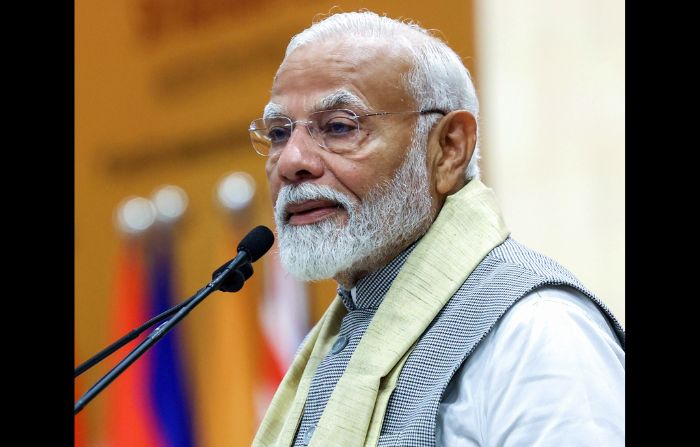- Friday, April 18, 2025
The prime minister assured that no government agency will threaten people by making phone or video calls, nor demand money during these calls

By: Shajil Kumar
PRIME MINISTER Narendra Modi has flagged the issue of fraudsters targeting people with the cyber crime of “digital arrests” and urged the people to be vigilant.
In his monthly ‘Mann ki Baat’ broadcast on Sunday, he said that while probe agencies are dealing with the issue, people should be aware and be on their guard.
During his broadcast, he also shared a conversation between a victim and a fraudster to highlight the cyber crime of digital arrest.
“The fraudsters of digital arrest phone calls, at times, impersonate as police, CBI, Narcotics; at times RBI… using such various labels, they converse as fake officers with a lot of confidence. Many listeners of ‘Mann Ki Baat’ have wished that we must discuss that,” he said.
“Let me tell you how these fraud gangs work. What is this dangerous game? It is very important for you to understand this,” Modi said.
Explaining their modus operandi, he said they collect personal information as their first move and then in their second move create an atmosphere of fear.
He said the third move of such fraudsters is the pressure of time.
“‘You have to decide now or else you will be arrested’ – these people create so much psychological pressure on the victim that one gets scared. People from every class and age group fall victim to digital arrest,” he said.
Modi also pointed out that people have lost thousands of rupees earned through their hard work, out of sheer fear.
“Whenever you receive such a call, don’t be scared. You should be aware that no investigative agency inquires like this through a phone call or a video call. I am enumerating the three steps to digital security. These three steps are – ‘stop’ ‘think and ‘take action’,” he said.
He said, “No government agency threatens you on the phone like this, neither inquires nor demands money on a video call like this.”
Modi said and urged victims to dial the national cyber helpline 1930 and report such incidents on cybercrime.gov.in.
He also urged people to inform family and police, and preserve evidence by recording the fraud call.
Advisory to public
Indian cyber-security agency CERT-In on Sunday shared a list that talks about more than a dozen ways in which online scams are being perpetrated by fraudsters in the country, including “digital arrest”.

The Computer Emergency Response Team of India (CERT-In) advisory said “digital arrest” is an online scam as “government agencies do not use platforms like WhatsApp or Skype for official communication”.
“Verify their identity by directly contacting the relevant agency,” it recommended.
The advisory said in a case of “digital arrest”, victims receive a phone call, e-mail or message claiming that they are under investigation for illegal activities, such as identity theft or money laundering.
The scammer threatens the victim with arrest or legal consequences unless he takes immediate action. They often create a sense of panic to prevent rational thinking, the advisory said.
Under the guise of “clearing their name”, “assisting with the investigation” or “refundable security deposit/escrow account”, individuals are coerced into transferring large sums of money to specified bank accounts or UPI IDs, it added.
The advisory asked people, who get contacted by such cyber criminals, to “not panic as scammers use fear and urgency to manipulate victims”.
“Take a moment to assess the situation calmly before responding. Avoid sharing personal information and never disclose sensitive personal or financial details over the phone or video calls, especially to unknown numbers,” the CERT-In said.
It stressed that people should not transfer money “under pressure” as legitimate law-enforcement agencies “will never pressure you into sending money immediately”.
“If someone demands money over the phone or online, it’s most likely a scam,” it said.
The advisory said staying “vigilant and informed” is crucial to protect oneself from this “emerging cyber threat”.
The advisory also spoke about other online cons like “phishing scams”, in which scammers create e-mails or messages that appear legitimate, often using logos and branding from trusted organisations; “lottery and prize scams” where victims receive notifications claiming that they have won a huge amount of money and to claim the prize, they are asked to pay a processing fee or taxes.
The advisory suggested a host of best practices and counter-measures to stay vigilant against such crimes and not give into the “pressure tactics” deployed by cyber criminals, who seek quick action by creating “a sense of urgency”.
₹1.2 billion loss
According to government figures, Indians lost about ₹1.2 billion (£10.99m) in ‘digital arrest’ frauds, in the first quarter of this year.
As many as 740,000 complaints were received between January 1 and April 30 this year, Indian Express reports quoting National Cybercrime Reporting Portal (NCRP) data.
S.P. Oswal, the 82-year-old chairman of India’s Vardhman Group, had recently filed a police complaint that fraudsters posing as federal investigators approached him as a suspect in a money laundering case.
They also organised an online court hearing via Skype where someone impersonated chief justice D.Y. Chandrachud and then he was ordered to deposit his funds in an account as part of the investigation. Two people from Punjab were arrested in this connection.
Bharti Enterprises chairperson Sunil Bharti Mittal recently claimed during an event that scammers had cloned his voice using artificial intelligence to con his executive in Dubai to transfer money. However, the vigilant executive grew suspicious and refused to comply.
Mittal claimed that when he heard the voice recording himself he was completely “stunned” as “it was perfectly articulated just as I would speak”. (Agencies)